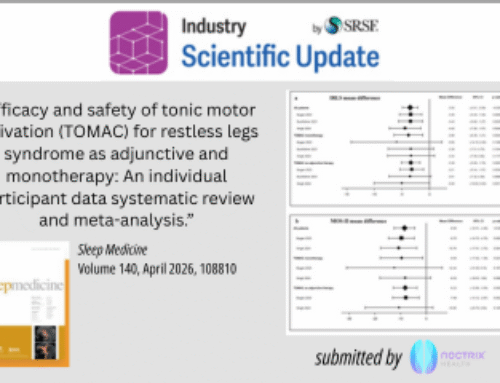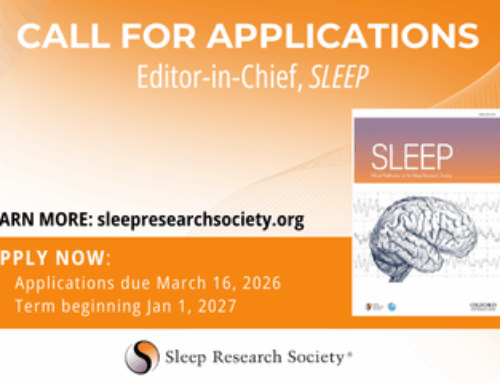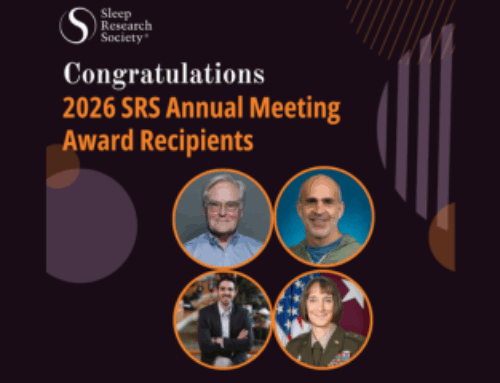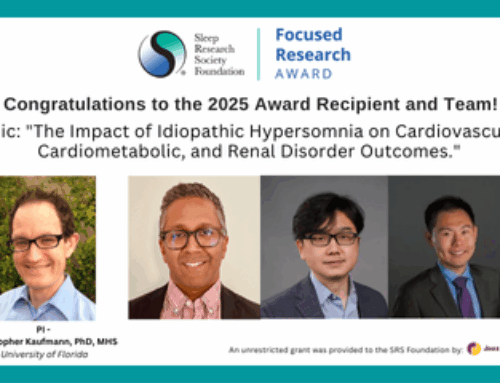The Sleep Research Society (SRS) has selected four sleep and circadian scientists as recipients of the 2025 Sleep Research Society awards, which recognize excellence in sleep and circadian research.
This year’s award winners will be recognized during the plenary session at SLEEP 2025 in Seattle, WA.
Distinguished Scientist Award
For significant, original and sustained scientific contributions of a basic, clinical or theoretical nature to the sleep and circadian research field, made over an entire career.
Mark Blumberg, PhD
Dr. Mark Blumberg is the University of Iowa Distinguished Chair and chair of the Department of Psychological and Brain Sciences at the University of Iowa. He has been a professor at Iowa since 1992, having received his PhD from the University of Chicago and postdoctoral training at Indiana University. He uses behavioral and neurobiological methods to help understand why animals sleep so much when they are young. His recent work in rodents and humans explores how spontaneous movements during sleep shape brain activity and development. He has also investigated and written about topics such as the origins of instinct, sensorimotor development, temperature regulation, animal communication, and the links between development and evolution. His research contributions have been recognized by the American Association for the Advancement of Science (AAAS Fellow), the International Society for Developmental Psychobiology (Senior Investigator Award), the American Psychological Association (Early Career Award; APA Fellow), and the University of Iowa (Regents Award for Faculty Excellence; Scholar of the Year Award). In 2014, he was honored by NIH with a MERIT Award. Blumberg has published 150 articles and chapters and three books of general science, including Freaks of Nature: What Anomalies Tell Us about Development and Evolution (Oxford University Press). In addition to co-editing The Oxford Handbook of Developmental Behavioral Neuroscience, he previously served as President of the International Society for Developmental Psychobiology and Editor-in-Chief of Behavioral Neuroscience. His research has been continuously funded by NIH for over 30 years.
Outstanding Scientific Achievement Award
For novel and seminal discoveries of a basic, clinical or theoretical nature that have made a significant impact on the sleep field.
Maria S. Robles, PhD
Dr. Maria Robles studied Biology at the University of Leon (Spain) to then moved to Madrid (Universidad Autonoma) to do her doctorate degree studying apoptosis in the immune system. After that she did her postdoctoral work in the laboratory of Charles Weitz (Harvard Medical School) where she established the first in vivo system to identify circadian core clock components by affinity purification-mass spectrometry. She then joined the laboratory of Matthias Mann (Max-Planck Institute of Biochemistry) with a Marie Curie Fellowship to pioneer the application of quantitative proteomics to the circadian field; describing, for the first time, endogenous daily rhythms of proteome and phosphorylation in total mouse livers as well as in isolated mitochondria. In 2017 Maria moved to the LMU Munich as a Tenure Track Professor where she got tenured in 2021. Her research focuses on the investigation of mammalian circadian- and sleep-driven mechanisms from molecular to system levels in health and disease using mass spectrometry-based quantitative proteomics.
Mary A. Carskadon Outstanding Educator Award
For excellence in education related to the sleep and circadian research field.
Lourdes DelRosso, MD, PhD
Dr. Lourdes M. DelRosso is a Professor and Vice Chair of Research in the Department of Internal Medicine at UCSF-Fresno, where she also directs the Sleep Medicine Fellowship Program. She earned her medical degree from the University of Miami, completed her Family Medicine residency at Kaiser Permanente-UC Irvine, and pursued a Sleep Medicine fellowship at Louisiana State University. She holds advanced degrees, including a Master’s in Medical Education from the University of Pennsylvania and a PhD in Health Sciences from the University of Portsmouth, UK.
A distinguished leader in sleep medicine, Dr. DelRosso serves as the Director of the World Sleep Academy and Co-Chair of World Sleep Day, initiatives of the World Sleep Society aimed at promoting global sleep health education and advocacy. Within the American Academy of Sleep Medicine (AASM), she has held prominent roles such as Chair of the Education Committee, the Diversity and Inclusion Taskforce, and the International Members Taskforce.
Dr. DelRosso is a dedicated educator and mentor, having supported the growth of many trainees and faculty across the U.S. and internationally. Her mentorship-driven approach is evident in her more than 150 peer-reviewed publications, many co-authored with her mentees. Her work embodies a deep commitment to advancing research, education, and advocacy in sleep medicine while fostering the development of the next generation of specialists.
Public Service Award
For significant and extraordinary contributions to the mission of SRS above and beyond research and educational activities.
Rafael Pelayo, MD, FAASM
Dr. Rafael Pelayo is a clinical professor at Stanford University’s Sleep Medicine division and the author of How to Sleep. He was born in Manhattan. He recalls first becoming curious about sleep as teenager. He studied biology at the University of Puerto Rico and graduated magna cum laude. His initial exposure to formal sleep medicine was as a first-year medical student at the Albert Einstein College of Medicine. There he met Dr. Michael Thorpy at the Montefiore Medical Center in the Bronx. That early clinical exposure with inspired him and became the focus of his professional career. He graduated with honors in research based on a project assigned to him by Thorpy to describe delayed sleep phase syndrome in public school students in the Bronx. He decided his pathway into sleep medicine would be through training in adult and child neurology. After completing his neurology training, he started a fellowship at Stanford under the direct supervision of among others Drs. Christian Guilleminault and William Dement. His senior fellows at Stanford were Drs. Jed Black and Ron Chervin.
Since 1993 he has worked at the Stanford Sleep Disorders Clinic treating patients of all ages. He teaches the popular Dement’s Sleep and Dreams to hundreds of Stanford students every year. He has lectured throughout the country and internationally. He helped lead the effort to delay school start times for adolescents in California, which became the first state in the nation to pass a law promoting adolescent sleep health. He also helped with a similar law being passed in Florida and continues actively working to promote sleep health throughout the country.
He currently volunteers in leadership positions for the American Academy of Sleep Medicine as chair of the Political Action Committee, Secretary of the National Sleep Foundation, board of the directors for Start School Later, and is the past president of the California Sleep Society.
Joy Wake
Joy Wake is previously the Policy and Advocacy Director for Start School Later. In 2017, Joy brought her experience as a marketing association president, education foundation co-founder, and parent organizer to the California Capitol, where she led legislative advocacy and communications for SSL in support of the country’s first ever healthy school start times law. The legislation was signed into law in 2019 and took effect in the 2022/2023 school year. Joy has been advocating healthy school start times since 2010, when she first witnessed the dramatic changes in her twin boys’ wellbeing after starting high school at 7:00 a.m.






